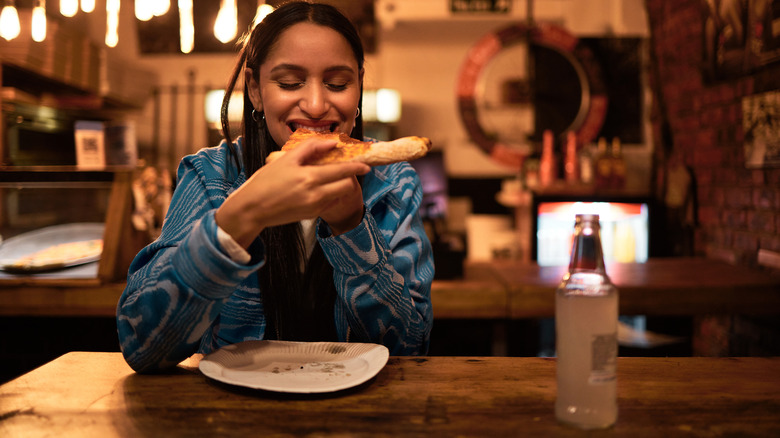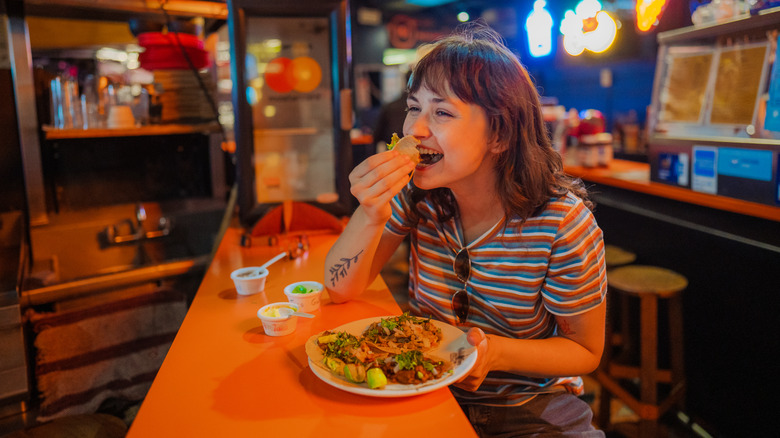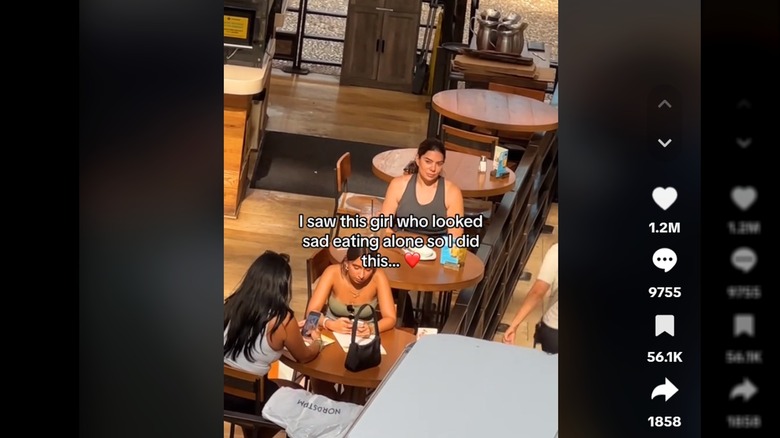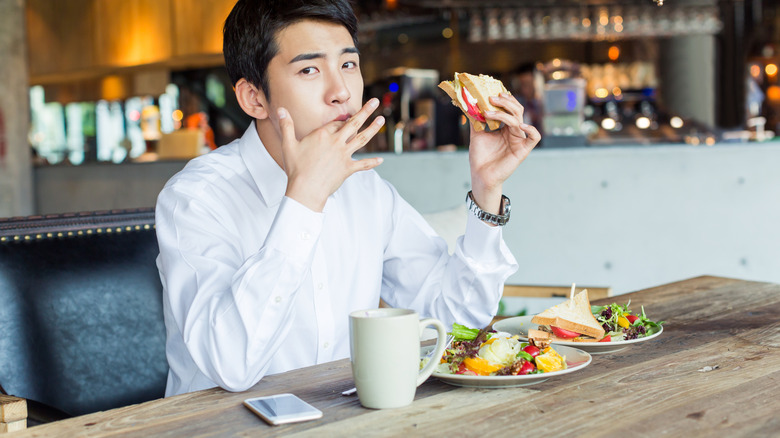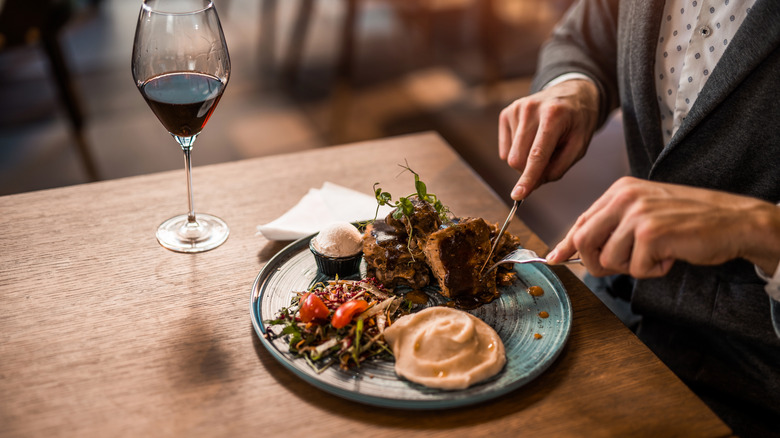Table For One Please: How Eating Alone Has Become One Of The Coolest Dining Trends
Everyone knows the sad scene in the coming-of-age movie where the unpopular kid eats lunch all alone in the school cafeteria. For sure, that's a bummer. But when you think about it more broadly, it's weird that eating alone has somehow become permanently associated with sadness and loneliness in the public mind, even when foodies have passed well into adulthood. Lots of people enjoy solo dining or even prefer it.
Most folks would probably give you a pat on the back or an enthusiastic "Exactly" if you uttered the phrase "You don't need other people to be happy." Yet per social taboo, it seems that you do need other people to enjoy a meal in public. Why? It might have to do with outdated social constructs, which are overdue for demolition.
On-screen depictions of these solo-flying foodies first turned me onto the glorious phenom that is the "table for one" — and I've never looked back. The charming, mysterious titular character "Amélie" (2002) goes to cafes alone and thinks impossibly artistic thoughts. Robert De Niro in "Taxi Driver" and Al Pacino in "The Panic in Needle Park" both have beloved diners that they regularly visit on solo dates. So why not try taking yourself to a coffee shop or diner alone and post up at a table beside the window. You too can be the moody, interesting protagonist, enjoying a killer meal while you self-actualize.
Different foodies value different aspects of mealtime
Consider why a shared-plates type of restaurant is often described as "family-style." In nearly every global tradition, a meal means friends and family coming together and connecting. Even the expression "breaking bread" refers to sharing a meal with somebody as a kind of spiritual and political uniter. But times are changing, and diners around the world are flipping the script. Whereas older generations might still uphold the more traditional viewpoint of eating as a strictly communal experience, younger diners are increasingly inclined to recognize solo dining as a rare self-care opportunity.
Plus, as self-professed "foodies" have cropped up all across the contemporary gastronomic landscape, the focal point of eating out isn't always the company around the table — it might be the food itself. And it's easier to appreciate when you're not as focused on keeping up with conversation or passing plates around the table. When dining solo, it's just you and your meal, which could lead to greater appreciation and deeper experience of the actual food, and even help one further develop their palate.
And this isn't an entirely new mindset. In Japan, this cultural trend took root a long time ago, and there are even eateries dedicated strictly to solo dining, "Bocchi Seki," with "Bocchi" meaning alone and "Seki" meaning seat or place.
Solitude doesn't equal loneliness...despite what social media might have you believe
It's no secret that the "social" aspect of social media often inspires FOMO, but even in the modern age, there's nothing wrong with hanging out alone and genuinely having a nice time. In one viral TikTok that has emerged as the subject of major backlash, the poster films a person eating alone from a distance (ostensibly without their consent), says "I saw this girl who looked sad eating alone so I did this...," and then pays for the stranger's meal. It's billed as a "random act of kindness," but the video is demonstrative of the larger sociocultural notion that time spent by oneself is inferior to and less desirable than social time.
Another TikTok with 3.9 million views satirically points out how presumptuous it is that some people immediately think it's sad to see an older person dining alone in public. Videos like these overanalyze very normal situations, and continue to propagate the idea no one would ever realistically choose to dine out alone if it can be avoided.
The value of solo dates cannot be overstated. Seeing movies and concerts alone can increase your depth of immersion. Solo travel is on the rise, with 18% of all global bookings made by solo travelers, per a study by OpenGrowth. Doing activities you enjoy solo can be empowering, and can also promote the opposite of social media's constant stimuli exposure – solitude and moments of stillness.
The 9 to 5 is dead and people are always busy
The increase in eating alone as a global dining trend may also be the product of busier lifestyles more than a conscious preference. If you've ever hit the Wendy's drive-thru and scarfed a Biggie Bag in the driver's seat of your parked car during a 30-minute lunch break, then you know what we're talking about here.
The average U.S. worker clocks 1,791 hours on the job every year. That's 294 more hours than workers in the U.K. and 442 more than in Germany. Another study by Los Angeles-based staffing firm Robert Half found that 45% of U.S. employees who transitioned to remote work during the pandemic consistently put in more hours now than they did when working in an office. Given this circumstances, setting one's own mealtime can be a necessity.
Solo dining is also more popular in cities, where restaurants are more plentiful and easier to access. And in many major cities, high restaurant density overlaps with a sizeable demographic of working adults, many of whom keep irregular hours. Furthermore, many of today's young professionals are freelancers, content creators, artists, and service industry workers, all professions which necessitate working any and all hours around the clock.
Put simply, in today's world, making dinner plans often means coordinating the schedule of several working adults, most of which are not simply in the office from 9-5. The earliest you're seeing each other is next Thursday, and even then that's only if no one gets called in last minute. Add to that the fact that nearly 40% of adults are single or living alone. Increasingly often, the best (or only) option is to take oneself out to dinner.
Table for one is a sexy thing to say
Few rituals are as hedonistic, as deeply rooted in pleasure, and as deliciously autonomous as the sit-down solo meal. When dining by yourself, you get to order for your whims alone. Allow us to paint the alternative scene: You want the buffalo wings as an appetizer, but your other dining companions want the devils on horseback. Maybe the conversation is lagging. Too bad — and now that your meal has arrived, you have to monitor whether you're eating too slow or too fast compared to everyone else. Are you all taking the same number of rolls from the bread basket? What a drag. Choose your own meal and your own dining pace. And while you're at it, let everyone in the restaurant know that you're secure and interesting enough to actually enjoy your own company.
It's worth point out that solo dining also opens the door for introverted foodies to take part in the dining-out experience anxiety-free, which everyone should be able to enjoy. It's a great option for folks with strict dietary restrictions, or anyone who had a hard day and simply doesn't feel like chatting. There isn't always something missing in the absence of social interaction — sometimes, that's where true peace and pleasure is actually found.
Don't shy away from any initial discomfort. Once you get over the hump, you might find that the words "table for one" come with a smile as they pass through your lips. The experience allows you to live in the moment and be present without any distractions. Maybe you'll find that the food tastes better because you're so focused on it, and you get a sense of inner calm from being so mindfully in the moment.
